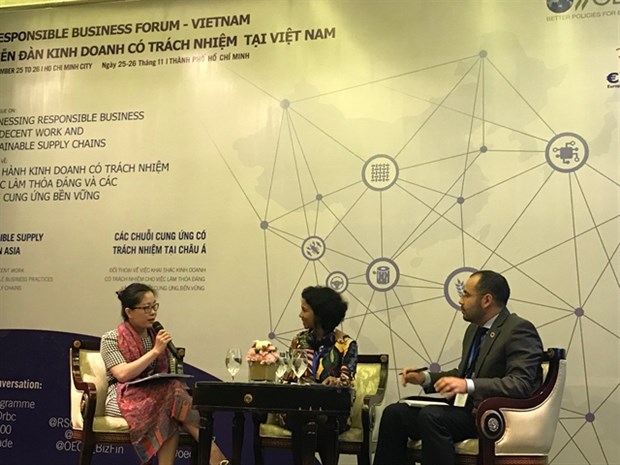
A "Responsible Business Forum" session discusses how governments can engage businesses in achieving Sustainable Development Goals (Photo: VNA)
Associations that represent enterprises also lack understanding and do not know how to guide their members to carry out SDG goals, Anh said.
Pham Anh Tuan, vice chairman of the Vietnam Fisheries Society, said the Government should provide detailed information about goals in each industry so that enterprises know what to do.
“They also need to know the benefits that SDGs bring, and how they will be affected if they don't carry out the goals,” Tuan said.
Tran Thi Lan Anh said that her organisation and relevant agencies were carrying out many projects related to SDGs with the assistance of international organisations.
However, these projects are small scale and cannot be expanded because of limited funds, she said.
A programme on preventing discrimination and sexual harassment at workplaces, for instance, is necessary but has not been carried out well at many enterprises.
According to other delegates, the promotion of gender equality, including LGBT rights and women’s economic empowerment in global supply chains, is rapidly growing among companies, governments, civil society and international organisations.
Empirical evidence shows that eliminating discrimination against female workers could lead to gains in productivity and competitiveness.
To Quang Phuong, head of the training division at Nha Trang University in Khanh Hoa province said that students also need to know about SDGs since they will be future employees.
Educational institutes, especially universities, should integrate them into their training programmes, Phuong said.
Other delegates said that NGOs could help enterprises carry out programmes that protect the health of workers at factories, which would contribute to the implementation of the SDGs among enterprises.
The two-day "Responsible Business Forum - Vietnam" is being held by the European Union, EuroCham, International Labour Organisation, Organisation for Economic Cooperation and Development, and the Vietnam Chamber of Commerce and Industry.
The forum also discussed the challenges and opportunities for businesses presented by Vietnam’s new commitments to the EVFTA and CPTPP and the ratification of ILO Convention 98, and specifically what policies and practices should be employed to ensure the country’s fulfilment of international labour standards.
It also provided a deeper understanding of international buyer demands and discussed mechanisms to support suppliers in meeting those demands. Greater collaboration between buyers and suppliers, including support in the form of technological tools, platforms and compliance measures, can support suppliers to strengthen labour and ensure their role in aiding sustainable development./.
VNA
 Central bank mulls raising gold position limit for lenders
Central bank mulls raising gold position limit for lenders



